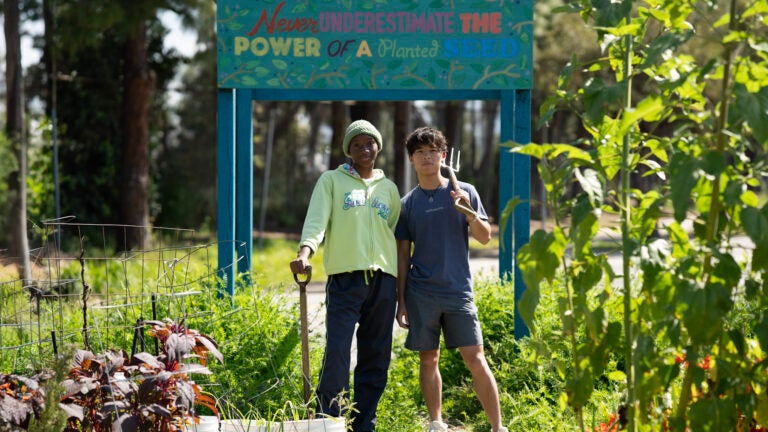
During the spring 2024 semester, environmental studies majors Munachiso “Muna” Obiefule (left) and Jack Chen interned with the Garden School Foundation at 24th Street Elementary School to facilitate educational programs for the school’s students. (Nick Neumann/USC Wrigley Institute)
Environmental Studies majors nurture vibrant gardens and bright minds
Just 2.5 miles from USC’s University Park Campus, in the West Adams neighborhood next to Los Angeles’s bustling I-10 freeway, lies an unexpected sight: a thriving one-acre edible garden at the heart of a public elementary school.
On a recent Monday morning, environmental studies majors Munachiso “Muna” Obiefule and Jack Chen arrived at the school eager to do more than reconnect with nature in the sprawling urban metropolis of Los Angeles. As Garden Education Interns with the Garden School Foundation (GSF), they play an important role in facilitating lessons in environmental stewardship and sustainability for the young students at 24th Street Elementary School.
Established to provide garden-based education to children at Title 1 elementary schools across Los Angeles, GSF began its partnership with 24th Street Elementary School in 2005 with the creation of its flagship garden on the campus grounds. Today, the garden not only boasts a wide assortment of productive fruit trees, vegetable beds, and native plants, but it’s also home to programs that benefit both the environment and local communities.


On this particular morning, Obiefule and Chen are helping with the “Seed to Table” curriculum. Led at this site by Garden Educator Laura Saenz, 24th Street’s students take gardening and cooking classes to learn how to grow, harvest, and cook their own healthy foods with ingredients sourced from the garden. For the day’s lesson, students harvest nasturtium leaves – which are edible and have a peppery flavor similar to arugula – and learn how to make a pesto sauce.
“Because we are in Central Los Angeles, in the middle of a food desert, there’s a lack of access to fresh foods like organic produce,” says Obiefule. “This garden helps connect students to where their food comes from and learn why it matters what they put in their bodies.”
Obiefule also shares that these lessons encourage students to step outside of their comfort zone and try nutritious foods. For example, many who didn’t like salad from grocery stores recently learned how to make a tasty soy sauce dressing and changed their perspective on the healthy dish.
In addition to the garden’s educational focus, which centers around themes of food justice, community health, and sustainability, Chen highlights another key benefit the garden provides for students: a calming space to recharge.
“If you look at the surrounding neighborhood, there’s not really a whole lot of green spaces. With the garden here, [students] get to spend time outside and in nature, which is a really important break from the classroom,” says Chen. “I noticed that whenever they come here, they’re always really excited and have smiles on their faces as they help us with planting or interact with compost. It’s a great way to supplement their education.”
When they’re not interacting with students, Obiefule and Chen complete caretaking tasks to ensure that the garden can support its various educational programs. They water plants, weed the beds, and help compost food waste for the garden’s Cafeteria to Compost program.

For Obiefule and Chen, the chance to work with the Garden School Foundation came from their enrollment in ENST 492: Directed Environmental Policy and Science Internship, which matches students with local environmental organizations to prepare them for environment- and sustainability-focused careers in policy and advocacy, management, education, and more, based on their interests.
Both students gravitated to the USC Environmental Studies Program because of its hands-on opportunities to learn outside of the traditional classroom and to experience the natural environment for themselves. So it was fitting that they were placed at an internship site that allows them to communicate the value of environmental education to the next generation of young students.
“Up until this internship and meeting my supervisor Laura, I had no idea that this type of job existed,” says Obiefule. “But this is my dream job. This internship really just opened my eyes to what fields I can go into post-grad. I feel like I’m moving in the right direction of what I actually want to do.”